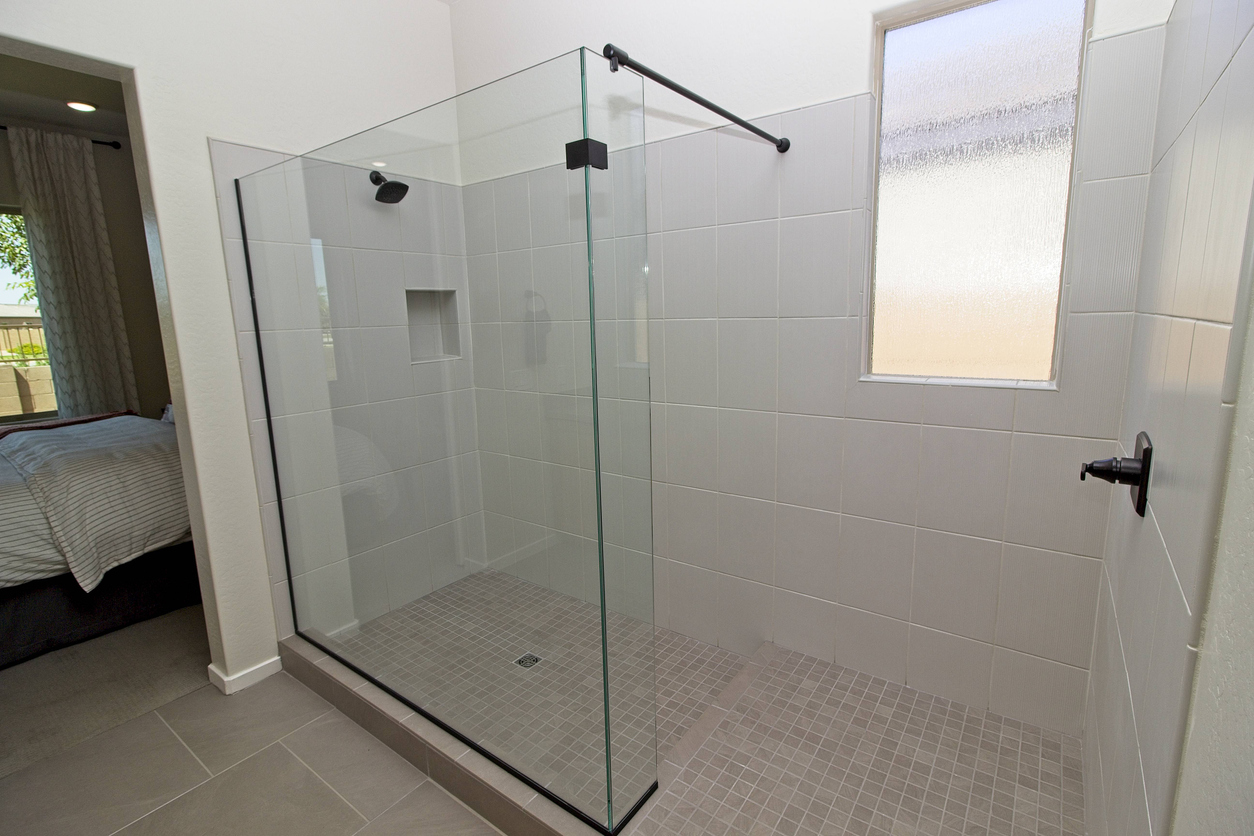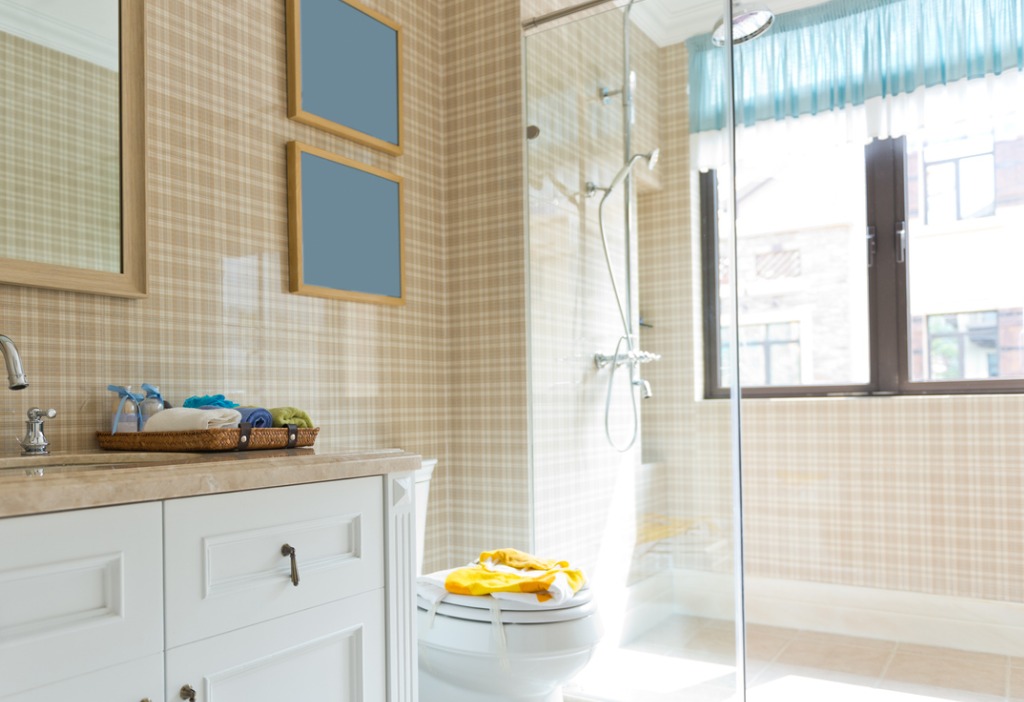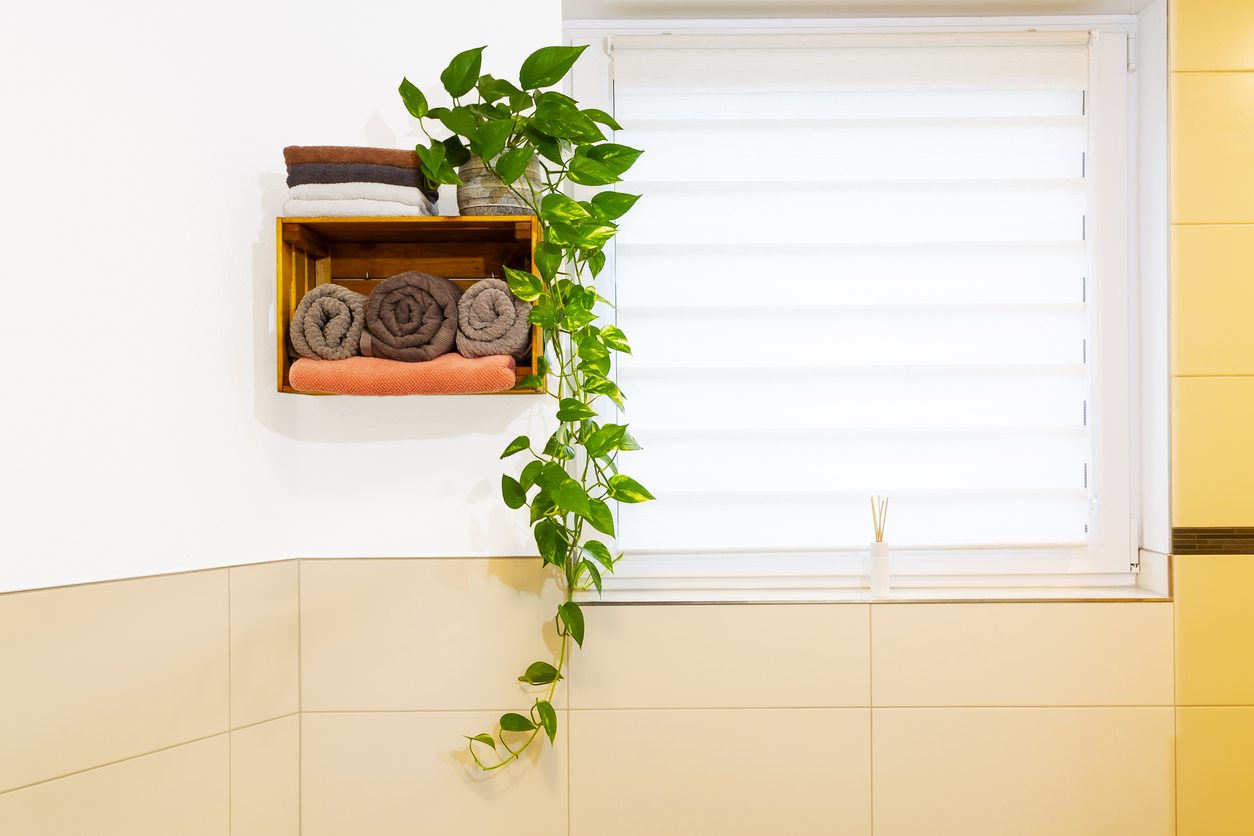We may earn revenue from the products available on this page and participate in affiliate programs. Learn More ›
Q: The shower in the main bathroom of our new home has a window. I’ve never seen such a thing before! How can I maintain my privacy while enjoying the sunlight the window offers?
A: While finding a window in the shower may still surprise folks, they’ve become an increasingly common construction feature for a few reasons. They offer a natural source of light and warmth, and create the illusion of larger shower dimensions, Most important, a shower window provides an escape route for odors and moisture in the air, thus staving off mold and mildew formation in the bathroom.
We understand your concern, though. Having a window in your shower may also give passersby and neighbors a glimpse into your most personal space. Fortunately, you can add privacy and still maintain brightness with these creative cover-ups, bathroom window treatments, and window replacement ideas.
Install shades or shutters to cover a window in view of the shower.

Window treatments are the simplest and quickest ways to add privacy. Two top choices are waterproof Roman shades, mounted over the window, or bathroom window shutters, which are vertical stiles and horizontal rails made of vinyl, polyvinyl chloride (PVC), or faux wood and fitted into the window frame.
- Shades can be pulled up or lowered with a lift cord that hangs from the top rod to add light and visibility or block it to boost privacy. Shades also lack slats through which heat can escape, making them a more insulating, energy-efficient option than shutters.
- Shutters, however, offer a greater degree of light and privacy control. Twisting the tilt bar (a long, stick-like apparatus) moves the slats up and down, altering the angle at which light enters. There are a wider range of style options available in waterproof shutters for shower windows than in shades. Also, you can treat regular shutters with a waterproof finish.
Whichever option you choose, it’s best to avoid bamboo shades or wood shutters in showers. They can warp or form mildew or mold with enough exposure to moisture.
Frost the window glass.

Frosted bathroom windows have an appealing pitted effect on one side that increases privacy by blurring any images viewed through the window. Choose from some popular DIY window frosting methods below.
- Static window cling film: For a temporary option, use static window cling film—a removable alternative to traditional adhesive window film—in a frosted design. Wipe down the window with a soft cloth moistened with glass cleaner, mist the pane with a solution of 12 ounces of water and a few drops of liquid dish soap, and then apply the film, enlisting a squeegee to remove any air bubbles.
- Spray paint: For a semi-permanent effect, pick up a can of frosted glass spray paint, like Rust-Oleum Frosted Glass Spray Paint, that dries into a decorative coating. Clean the glass as above, use painter’s tape to protect the window frame, and then apply a thin coat of the spray paint to the pane, letting it dry per the product instructions. The paint can be removed later with a glass scraper.
- Etching: A glass-etching cream—Armour Etching Cream is a good one to try—will permanently frost windows in the shower by removing a thin layer of glass, leaving a frosted finish. Tape off the window frame, apply the cream to the pane with a bristle brush, and let it rest as directed per product instructions before rinsing the cream off with warm water.
Or, tint your bathroom window with window film.

Tinting windows a darker color with an aftermarket film on the interior side will also enhance privacy. These lightweight, self-adhesive coverings are made of polyethylene terephthalate and come in a range of types and colors, from weather-resistant security film to heat-absorbing solar film, and from silver to copper. Because certain types of film may possibly damage glass, check that applying window film will not void your window manufacturer’s warranty.
To apply film, cut the film to the size of your shower window with a utility knife, remove the adhesive backing, and then stick the film to the pane from the top down. Allow the film to cure completely, which can take anywhere from 4 to 8 days. You can shower during this period, but be sure to use the exhaust fan to keep humidity levels low to speed up curing. Do not attempt to clean the film until after it’s fully cured.
Replace the window in the shower with glass blocks.

If you have a single-pane window (i.e., one layer of glass) in the shower , consider replacing it with a network of glass blocks, which are thick, solid or hollow pieces that blur whatever’s behind them. Bonus: Glass blocks also double the insulation of the window. They can add an element of luxury to the shower, and can be customized to convey attractive effects ranging from pebbles to cracks. The downside is that they’re costly, and will run anywhere from $400 to $1,000 per window. Putting them in isn’t a DIY-friendly job, either.
Glass block installation requires a pro to cut the blocks to size, remove the existing window from the frame, and lay the blocks into the wall. Then mortar is placed in between the blocks and steel rods are driven through the mortar to maintain structural integrity (without the rods, the weight of upper rows of blocks can cause lower ones to crack). Finally, the contractor will seal the upgraded shower window with a waterproof caulk to stave off rot around the edges.
Bear in mind that you can’t open glass blocks as you can a traditional window, and poor bathroom ventilation can easily lead to mildew or mold problems. To avoid this issue, install an exhaust fan and use it during and after every shower.
Install bathroom window curtains.

If you can find the correct type, curtains can work well in a bathroom window. Many retailers sell waterproof bathroom window curtains made of polyester, vinyl, or other modern blends that can withstand the humidity of a bathroom setting.
Another option is a shower curtain cut down to size. For example, get a duplicate of your main shower curtain for a cohesive look. Whatever shower curtain material you select, there are a wide variety of colors and designs from which to choose. Be sure to avoid natural fibers such as cotton, which can absorb moisture and promote the growth of mold and mildew.
Depending on the size of the window and the size of the shower, hanging the curtains from an inset tension rod rather than an outside-mount rod might be less intrusive, especially in smaller bathrooms.
Enclose and landscape the view from the window.
Consider building a “screen” in your yard that blocks passersby from looking in the window, something similar to a basement window well, albeit above ground. Build a three-sided frame, and then use 4-inch slats spaced ½-inch apart so light can still travel through the window and into the bathroom. Build it a few feet taller than the top of the window to ensure privacy. Paint it to match the siding or trim on your home. You could then add interest to the screen by adding a few plants around it, or plant a vine or two to scramble up the screen.
Alternatively, tall, bushy shrubs planted outside of the bathroom window can block potential peepers. Be sure to select plants that are known to do well year-round in your region, and check to make sure the shrubs you choose are evergreen.
Place humidity-loving plants along the window sill.

You could also bring nature indoors as a visual barrier: Arrange a selection of plants in a row on the window sill. Choose tall, narrow pots if you can find them, and select tall plants that like humid conditions, such as majesty’s palm, calathea, some varieties of snake plant, and bird’s nest fern. Be sure to place planter saucers or coasters under your pot to collect water that pases through the soil.
To complete your indoor foliage screen, consider hanging a couple of trailing plants—golden pothos or English ivy, for example—from the ceiling and in front of the window. For hangers, retro macramé might be fun, or maybe a hanger made of metal is more your style.


